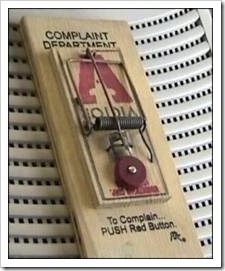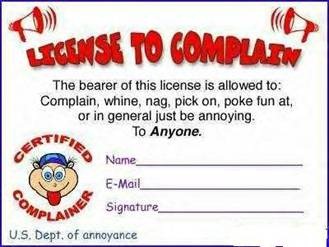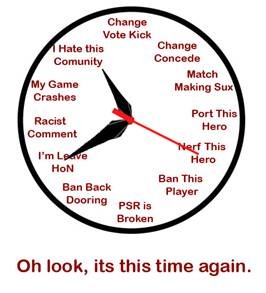
Birthdays are a great time to take stock and count our blessings. This month, I counted lots of success while preparing to celebrate my birthday. Some people do not believe me when I say I have not been successful all my life. In fact, until the age of 16, I was anything but successful. Many people believe that change takes a long time and I thought so too until I changed. It only took two months going from being a total failure and being kicked out of school to being successful, being a school captain and starting on the path to a scholarship for excellence. The failing Ronit would say it was just luck. The successful Ronit would say it was a change of mindset. On the junction between the two Ronits, I put up a mental guard that will help me monitor my mindset. This guard was in charge of reminding me the painful truth about the difference between winners and whiners.

With crying as their only tool for communication, they win most of their battles by whining. Unfortunately, this is when they also develop the belief that whining is a good way to get things in life.
Whether this mindset will stay with them for life or change depends on the baby’s social agents, especially the parents. If they consider the crying baby to be a complainer (“What’s wrong? Why are you crying so much? It’s not the end of the world”), he or she will grow up to be a complainer. If they see crying as a form of communication (“Yes, Mommy is here. You’re right. You’re all wet and Mommy needs to change your diaper”), he or she will grow up to be a communicator. When those two babies grow, they will both have the desire to be successful, but one of them will go for it and the other one will complain about not having it.
I have made a huge shift in my life (and quickly) when I took the time to reflect about the way I think. I examined those who were successful in my eyes and those who were losers (sorry) like me and found 10 things that were different between them.
Choice vs. Chance
 I discovered I always believed I think the way I think because of my life circumstances and never considered that my circumstances were due to my way of thinking. I looked at successful people as being lucky and since luck is beyond our control, it saved me the hassle of choosing. I complained about my bad luck and nothing more. I cried about my horrible life that I did not choose. I expected my parents to fix my problems and they could not do it, so I blamed them for that too.
I discovered I always believed I think the way I think because of my life circumstances and never considered that my circumstances were due to my way of thinking. I looked at successful people as being lucky and since luck is beyond our control, it saved me the hassle of choosing. I complained about my bad luck and nothing more. I cried about my horrible life that I did not choose. I expected my parents to fix my problems and they could not do it, so I blamed them for that too.
It is not chance, it is choice that determines your destiny. Make the choice to be successful and know that winning any battle requires making decisions. Some decisions may be tough to make, but not choosing is a choice too. When you make a choice, you may not be successful, but it is much better than letting circumstance make the choice for you. At the very least, it is an opportunity to exercise your choice muscle and it is gives you a sense of control.
Done vs. Should Have Done
I also learned I used a lot of “should” in my language. In good times of motivation (that only lasted for three days), I said, “I should have studied for a test”, but did nothing more than get angry with myself for not studying for a test. I had many “tomorrow I will” and my life was full of things I should have done but without much doing. I used to beat myself up for not doing what I should have done. That self-blame was the price I thought I should pay those who expected too much of me and it was a great way to get them off my back.
If you find yourself regretting things you should or should not have done, make sure it is not a token statement. Every “should” is like shooting yourself on the battlefield of life. It does not take you anywhere. It is another form of whining about not doing something. Remember, you cannot be both winner and whiner.
Commitment vs. Maybe
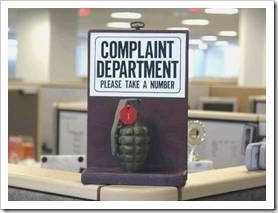
Although winners are not better fortunetellers, they face the future with a lot more certainty. Winning gives you the confidence you can and losing makes a hole in this confidence and a belief that maybe you cannot starts sprouting.
The difference between winners and whiners is not in the number of failure experiences but in the way they handle failure. Winners do not let a failure change their core belief in themselves. They are committed to learning how to do things differently until they succeed. Losers consider every failure as proof they are losers and they whine about it until they believe that they are.
Responding to Stress
We do not choose many of our life’s battles. They come and only sometimes, time makes them go away. Most of the time, we have to win them or they will knock us out.
Stress is one major battle that most people must go through and winners and losers respond differently to stress. Successful people see stress as part of life, which can be made to go away, so they take ownership, are accountable, take responsibility and focus on their actions to get themselves through the stress.
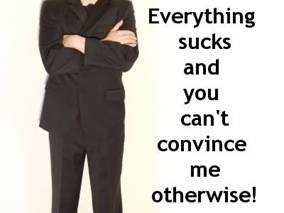
Responsibility vs. Blame
In my dark losing days, I reacted to pressure exactly like this. My failures had nothing to do with me. I explained all my life’s failures with excuses for why I was the way I was and blamed the whole world for everything wrong in my life – my parents, siblings, teachers, friends and anyone else around me. I whined so much about circumstances and about others that it left no space for taking responsibility over my own actions.
When I meditated on my life for about two months, I discovered that blaming others gives them power they never had. I was giving them power and taking away power from myself. I sat for two months and asked myself, “What do I do that contributes to this?” and although it was hard to answer, after the brutal honesty, I felt powerful. Motivation did not last for 3 days but for weeks and every week, it increased, because I stopped whining about what others did or did not do and started focusing on what I did or did not do.
Responsibility is only heavy when you do not understand how much power you gain from it. The reason we talk about taking responsibility is that no one can give it to us. It is something we have to take.
Chunking Down vs. Chunking Up
 I discovered that I faced the battles of life differently to those who were successful. When I faced a challenged, I chunked it up in my mind. I took the tiniest problem and made a mountain out of it as an excuse for being unable to handle it. I looked for reasons not to face my problems and dedicated lots of time to whining about my misfortune.
I discovered that I faced the battles of life differently to those who were successful. When I faced a challenged, I chunked it up in my mind. I took the tiniest problem and made a mountain out of it as an excuse for being unable to handle it. I looked for reasons not to face my problems and dedicated lots of time to whining about my misfortune.
When I looked at those who were successful, I realized they had problems too, but they chunked them down and split their problems into tiny parts that were easy for them to manage. A scary exam was just 5 lessons. Every lesson involved some reading and doing some homework. Some of the reading was done in class and doing homework every day when the material was fresh meant doing a little bit of easy stuff.
I tried it once and it was magic, so I have used it ever since. Even today, I manage overwhelm the same way. A great technique I learned in the army was “Everything can be divided into 3 parts”. Every part can be divided again into 3 parts. Try this:
- Write what the problem is, e.g. “I don’t have time”
- Write 3 things that contribute to this problem, e.g. “work, housework, tired”
- Take each items from step 2 and write 3 things that contribute to it, e.g. “Work: my wants me to stay over time, I leave early not to get into traffic, I bring work home. Housework: it takes time to shop, dinner takes a long time, I clean by myself every evening. Tired: I go to sleep late, I get up early, can’t sleep in on the weekends, because of the kid’s activities”.

- If any items are left without a solution, split each of them up into 3 parts and try again.
If you do this with every problem, you will find your life’s bottlenecks and shift from whining about your problems to solving them. Try. It always works.
I think my biggest awareness was that winning and whining cannot live together. It is a question of focus. You can only focus on one at a time. When you whine, you focus on the problem and on what does not work. When you focus on finding solutions, your mind starts finding them faster and better and soon enough, you are on the winning side.
A challenge whiners have is not being aware of their whining tendency. If someone draws their attention to that tendency (by telling them they are complainers, procrastinators, lacking responsibility and problem oriented), they shift from whining about some topic to whining about the person telling them to stop whining.
If you have a whiner around you, it is a good idea never to take on yourself the responsibility to help them. When you support them, they will drag you into their whining mode, but they need to help themselves. Remember, their socializing agents have taught them that crying was a way to solve problems and they are only doing what they can. You cannot change other people. They need to be willing to let go of the person they are in order to be the person they want to be.
If your whiner is one of your children, it is a good idea to shift their attitude as early as possible. Here are 5 ways to help them:
- Be a role model. Pay attention to your own whining tendency and control it.
- When a child whines, explain that this is not communication and say, “Tell me how you feel” or “What do you want?”

- Teach them the difference between winners and whiners and play a game of analyzing behavior by asking, “Is this a winning or whining behavior?” The more your kids watch other people, the easier it will be for them to come up with their own winning formula.
- Give them opportunities to experience many small successes that will leave no room for whining.
At the age of 16, after being able to compare my whining attitude to my winning attitude, I came up with a magic question that functions as a guard, a police officer that helps me assess my situation and alert me when I am going back to the my losing habits. On everything that happens in life, good or bad, I ask myself, “Am I winning or whining?”
Be happy. Happiness is a choice!
Ronit
